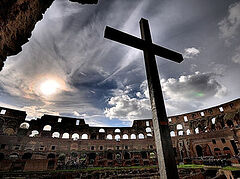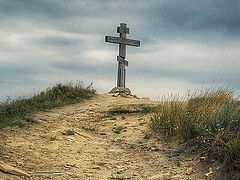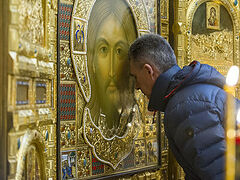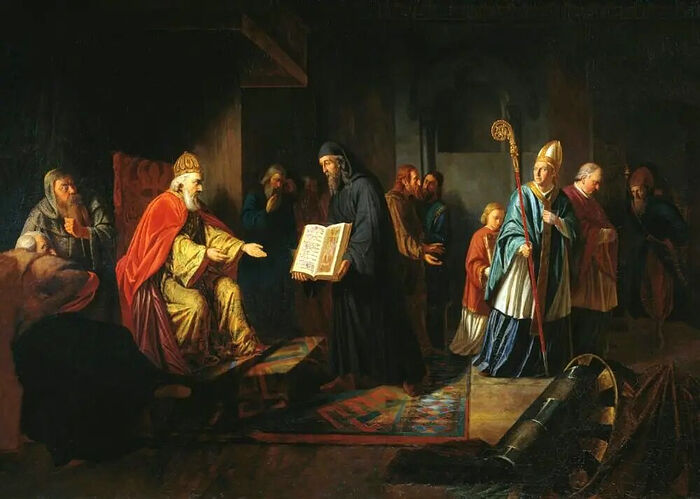 Ivan Eggink (1787-1867). Grand Prince Vladimir Chooses a Religion.
Ivan Eggink (1787-1867). Grand Prince Vladimir Chooses a Religion.
Everyone who reads Church history should remember what a deep impression a Patriarchal service at the great Hagia Sophia Cathedral in Constantinople made on the souls of Grand Prince Vladimir’s ambassadors, whom he had sent to find a new faith for Russia. One of the greatest (not only in size, but also in design and spirit) buildings in the world, even now Hagia Sophia, turned many centuries ago into a mosque, still leaves an indelible impression on your soul. Its majestic dimensions, its great dome (which turns on the cathedral like the sky), an array of columns from four sides above, and the breath of freedom and eternity, delight and excite you when, with a trembling heart, dying of curiosity, you enter this glorified sanctuary of Orthodoxy, about which, more than about any deserted church, one can say with the words of the poet (Michael Lermontov): "an abandoned church is still a church."
The Russian ambassadors stood, listened and watched. The splendor of the church, the clergy in beautiful vestments, the quiet and sacred movements, the harmonious singing of the clergy, and the presence of Someone Invisible and Incomprehensible felt throughout this solemnity delighted the ingenuous and simple souls of Vladimir's ambassadors. It seemed to them that they were in heaven, and not on earth. On returning home, they enthusiastically told Vladimir about the Greek religion.
A foreign merchant who had trade relations with Novgorod sometimes visited it. There was probably a rich treasury of religious, still unconscious feelings in his soul. As he visited Russian churches, he experienced such extraordinary moments there that he began to go to them more and more often. Finally he got to the point when it was no longer his distant native country that seemed to him his motherland, but this city, inhabited by a foreign people who spoke a foreign language.
The white cathedrals and churches of Novgorod with their pillar-like belfries, dark images on icons illuminated by burning candles and softly glimmering icon lamps, monasteries that dotted the banks of the full Volkhov River, and everyday life of Orthodox Russian antiquity, gained some power over his soul. The merchant converted to Orthodoxy, gave his possessions to the poor, and became a “fool” for Christ's sake.
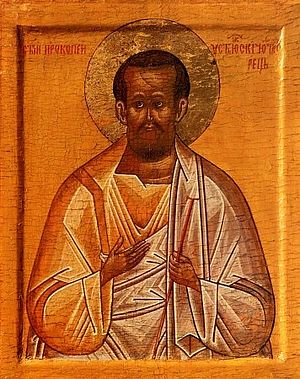 St. Procopius of Ustiug That was the beginning of the marvelous podvig of St. Procopius of Ustyug, a “Fool-for-Christ”.
St. Procopius of Ustiug That was the beginning of the marvelous podvig of St. Procopius of Ustyug, a “Fool-for-Christ”.
A boy lived in the Horde who was a nephew of Khan Berke. At that time Bishop Kirill of Rostov, whom his contemporaries called “blessed”, came to the Horde. He came on church matters, was received by the khan kindly, and the khan gladly listened to Kirill's accounts about how St. Leonty of Rostov had preached Christianity in Rostov and how miracles occurred from his relics.
When, after the saint’s departure, the only son of the khan fell ill, he remembered Kirill’s stories and sent him many gifts with the request to return to the Horde and heal the sick boy.
The saint celebrated a service of intercession before the shrine of Bishop Leonty, blessed the water, and with this water travelled to the Horde and healed the khan's son. All these events were seen and all the stories of Kirill were listened to by Khan Berke’s nephew.
Some sweetness poured into his heart from these stories. There was a revolution in his soul. He longed to know the True God and decided to follow Kirill. He was very keen to see Russian churches where services were celebrated to the mysterious and all-powerful Christian God and where the miracles that Kirill had spoken about occurred.
His father had already died, and his mother, a widow, kept her husband's enormous wealth in order to pass it on to her son when he grew up. One can imagine her grief when her son announced that he was leaving the Horde. In vain did she try to hold him back with pictures of the carefree, honorable and happy life that awaited him. The thirst to go to the land that believed in the Christian God, Who already possessed his soul, was insatiable.
He distributed part of his wealth to his fellow-countrymen in need, entrusted the other part to Bishop Kirill, and secretly left the Horde after him.
Everything was new to the royal youth during his long journey from the Horde to Rostov. With joyful trepidation he accepted the first impressions of the Orthodox Russian country.
Now he was in Rostov, in the famous splendid Church of the Dormition of the Mother of God. Choirs were singing harmoniously on two kliroses. The icons, as if a reflection of heavenly beauty, sparkled with precious adornments, illuminated by the flames of countless softly glowing candles, with puffs of incense floating like light transparent clouds over the praying crowd. In those moments, in this incomparable beauty of Christian worship, the prince began to feel God. He seemed to clearly feel some kind of connection between that praying crowd, that church, which the love of people had erected for the Creator of the world, and The lofty and unfathomable One, to Whom the prayer of this people was streaming up, to Whom the choirs were singing, for Whose glory the flames were burning and incense swirling.
At that moment the sun of truth rose, as the chronicler says, in the prince’s soul: he had come to know the Christian God and saw Him with the eyes of faith. Falling at St. Kirill’s feet, he asked to be baptized. But Bishop Kirill had to think about the safety of his entire flock. He was afraid of the Khan's wrath on the whole Russian land if the news of the Baptism of his nephew reached him. Therefore, he hesitated to fulfill the prince’s request.
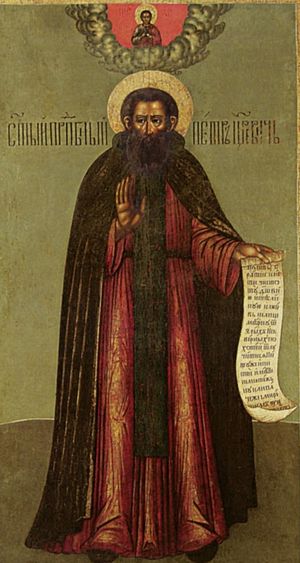 St. Peter, Tsarevich of the Horde. Central image, from the Church of the Laudation of the Mother of God, Rostov. Late 17th-early 18th c. The prince stayed to live in his house, attending churches and studying the Russian language. At last the time came when he could be christened. Khan Berke died; turmoil began in the Horde, and the prince was forgotten. In Baptism he received the name Peter. He remained with Bishop Kirill until the latter’s repose.
St. Peter, Tsarevich of the Horde. Central image, from the Church of the Laudation of the Mother of God, Rostov. Late 17th-early 18th c. The prince stayed to live in his house, attending churches and studying the Russian language. At last the time came when he could be christened. Khan Berke died; turmoil began in the Horde, and the prince was forgotten. In Baptism he received the name Peter. He remained with Bishop Kirill until the latter’s repose.
Bishop Kirill’s labors were carried on by the famous Holy Hierarch Ignatius, and Prince Peter of the Horde continued to live in his house, leading a pious and pure life. After the Apostles Peter and Paul had appeared to him, he founded a monastery in the vicinity of Rostov, although he remained a layman until old age.
Bishop Ignatius married him to the daughter of a nobleman from the Horde who had settled in Rostov. And the prince fraternized with him, and the saint strengthened this spiritual brotherhood by church prayer.
Silent, always busy in his soul now with prayer, now with reflections on eternity, the faithful Prince Peter was the father of all the poor and unfortunate, outliving both the prince--his sworn brother--and St. Ignatius. Widowed at a ripe old age, he became a monk, and peacefully passed away around 1280. He gave the world an example of what power the Church, with its services, has over the soul.
***
Let us allow that sometimes a person, under the influence of his friends’ talk, or negative books he has read, speak against the Church. But in fact, during some Vigil, to the touching melodies of an exaltation, to the doleful sounds of the great doxology: *I said, Lord, be merciful unto me: heal my soul; for I have sinned against Thee*, in a scantily lit church, some incomprehensible tenderness touches the soul, some blessed calm, which is nowhere else experienced more completely than here...
Where can we be completely calm, safe and happy? Only where our true calling, our permanent vocation is. And where is our true calling? Where is the work to which we are always called, which we will serve even when the world is destroyed and only human souls remain with God Who created them? What is our eternal work, if not in the glorification of Christ? But churches exist only for this, and everything that happens in them has only one goal—the ceaseless glorification of Christ.
And the Church wisely distributes its services in such a way that it thanks God several times a day; and with the ringing of its bells notifies those who due to worldly circumstances cannot constantly attend church, that yet more prayer to God is taking place in church...
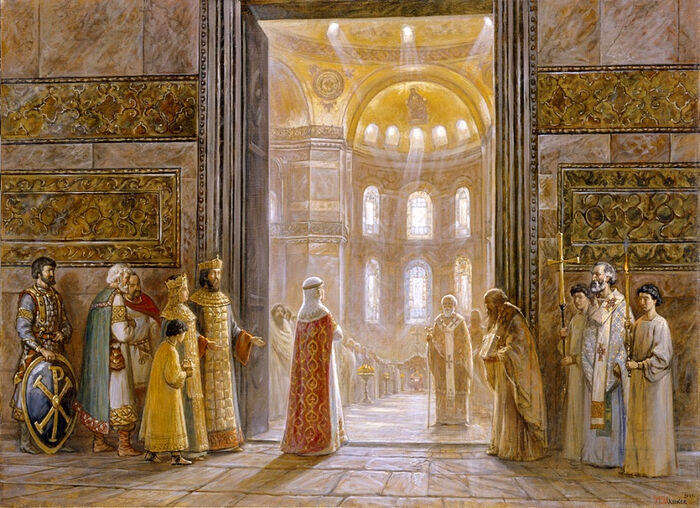 The Artist I. Mashkov. The Holy Equal-to-the-Apostles Grand Princess Olga enters Hagia Sophia in Constantinople.
The Artist I. Mashkov. The Holy Equal-to-the-Apostles Grand Princess Olga enters Hagia Sophia in Constantinople.
Except for festive solemn services, when churches are packed and clergy serve in their finest vestments, and a full choir sings on the kliros, and when the bells are ringing with all their might—have you ever been in an almost empty church at the early Liturgy and on a winter day, when whole church is nearly drowning in darkness, and penny wax candles barely light up the outlines of the iconostasis of the altar where the service is being celebrated? Have you heard the droning voice of a reader singing the melody of the Cherubic Hymn alone? And in this humble atmosphere have you marveled at the greatness of Christ’s sacrifice and the miracle taking place in the midst of this emptiness?
Then, not distracted by anything happening outside—neither by your neighboring parishioners, nor by the radiance of the sun and life outside the church windows, which happens on a feast day in a great gathering—were you not tranported in thought to the holiest moments of Christianity? To Christ’s preaching, the hour of the Last Supper, the Passion, death, burial, three days in the tomb, Resurrection and Ascension? Did a row of apostles then pass before your mind’s eye with a fiery word and with a spiritual sword, subduing people and nations to Christ? Did the victorious faces of the martyrs and young virgins with palm branches of suffering on their shoulders rise before you with blood-stained, tormented, chopped-off and sawn-off members of their bodies? Did the great silent ascetics of old look into your soul? Did the illustrious humble holy hierarchs shine with the treasures of their words, and among them did St. Nicholas the Wonderworker shine with mercy and the flame of his help? Did strange images of fools for Christ’s sake, full of love and sorrow—misunderstood, persecuted, and praying for their offenders—appear to you? Did they look at you here, from this holy darkness? Did innocent virgins smile at you, crowned with incorruptible crowns of heaven? And did you feel then, in those moments of complete detachment from the world and immersion in the realm of the Divine, your ability to stay forever in this realm, forgetting the world…, the things that are in the world (1 Jn. 2:15), and standing like that all your life, peering into these mysterious and inviting images, reveling in this happiness of unity with Christ and complete surrender to Him?...
Try it.
To be continued…

